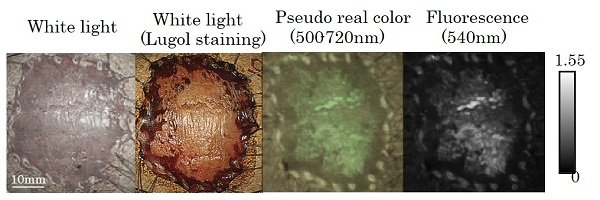Fluorescent probe for easy esophageal cancer diagnosis Enzyme specifically activated in esophageal cancer as molecular target


Fluorescence images after spraying with probe
The tumor lesion was difficult to detect by white light imaging (left). Just 10 min after spraying probe, the tumor lesion was clearly and specifically visualized and fluorescence-positive site matched well with the lugol voiding lesions (right). Lugol staining is useful for identifying ESCCs, because tumor lesion was unstained. However, discomfort has frequently been reported after lugol staining. On the other hand, probe is low stimulation and patients could receive painless examination.
© 2016 Haruna Onoyama.
A University of Tokyo research group has developed a reagent which fluoresces a few minutes after being sprayed on esophageal cancer. This reagent may find applications in early diagnosis of esophageal cancer in clinical settings such as during endoscopies.
The research group has already reported a fluorescence imaging probe that is activated by a specific enzyme that is known to be overexpressed in many types of cancer, and demonstrated its function in cancer model animals. However, the properties of human cancers are extremely diverse and the group did not know whether the probe was effective in human cancers. In addition, esophageal squamous cell carcinoma (ESCC) develops rapidly and is difficult to treat compared to other cancers of the digestive tract, but treatment often leads to a positive outcome if the cancer can be detected early. However, as early detection is difficult to achieve by conventional endoscopy, a novel method for detection of ESCC was called for.
The research groups of Professor Yasuteru Urano at the University of Tokyo Graduate School of Pharmaceutical Sciences and Graduate School of Medicine and Professor Yasuyuki Seto at the Graduate School of Medicine Department of Gastrointestinal Surgery, have developed a useful fluorescent reagent for ESCC. In the present work, the researchers produced a library of fluorescent reagents that target a variety of enzymes, and confirmed the effect of the reagent using tissue samples from patient tumors during endoscopies, determining that the probe for DPP-IV activity could rapidly visualize ESCC. Spraying the probe on human tissue excised during surgery or endoscopy, within a few minutes ESCC cells alone fluoresced, differentiating affected cells from surrounding normal tissue.
This technique will greatly assist early diagnosis of ESCC, something that has been difficult to date. In addition, it will be possible to make accurate diagnosis of the extent of the cancer, enabling more radical endoscopic treatments. Further there is currently no means of assessing at the time of surgery whether the entire cancer has been removed, if this probe is employed during surgery, it may become the first diagnostic technique for evaluating if cancerous tissue remains.
Currently, with the aim of making this fluorescent reagent commercially available as a clinical drug, as well as demonstrating the utility of the probe in a other cancers, preparations are being made for clinical trials in collaboration with Goryo Chemical Inc. and with funding from University of Tokyo Edge Capital (UTEC).
“Using a small organic molecular fluorescent probe to target specific cancers is a highly valuable achievement,” says Urano.“Visualizing cancer cells is exceedingly important during clinical treatment, and our newly developed probe may lead to new medical strategies,” adds Seto.
Press release (Japanese)
Paper
, "Rapid and sensitive detection of early esophageal squamous cell carcinoma with fluorescence probe targeting dipeptidylpeptidase IV", Scientific Reports Online Edition: 2016/06/01 (Japan time), doi: 10.1038/srep26399.
Article link (Publication)
Links
Graduate School of Pharmaceutical Sciences
Department of Gastrointestinal Surgery, Graduate School of Medicine (Japanese)
Laboratory of Chemical Biology and Molecular Imaging, Graduate School of Medicine
Laboratory of Chemistry and Biology, Graduate School of Pharmaceutical Sciences






